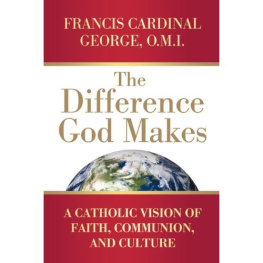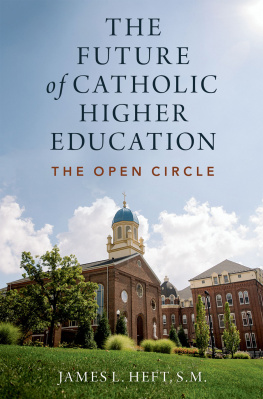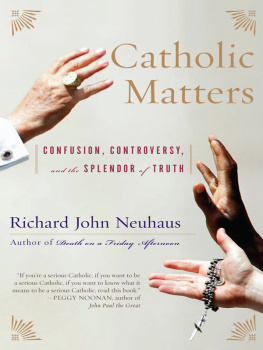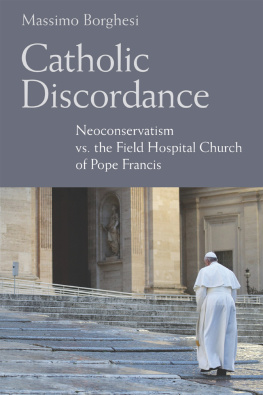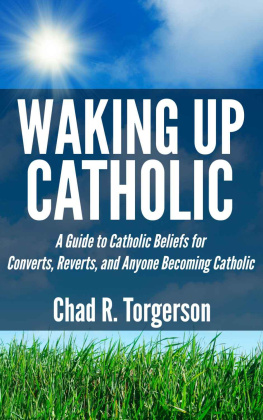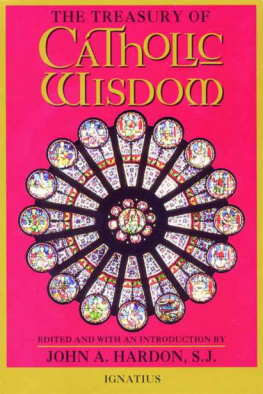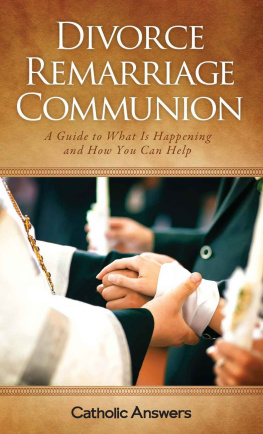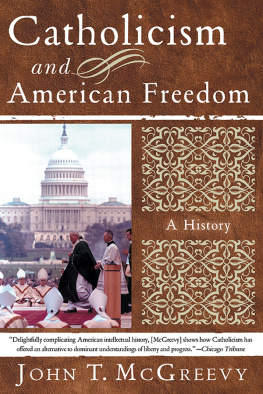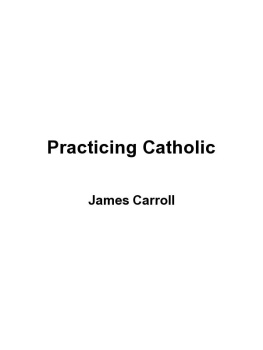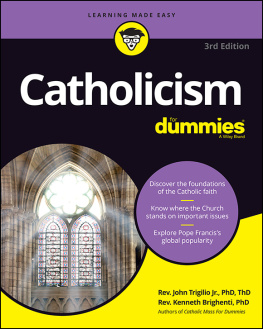The Difference God Makes
A Catholic Vision of Faith, Communion, and Culture
Francis Cardinal George, O.M.I.
The Crossroad Publishing Company
A Herder & Herder Book
www.CrossroadPublishing.com
The Crossroad Publishing Company
www.CrossroadPublishing.com
2009 by Francis Cardinal George, O.M.I.
All rights reserved. No part of this book may be reproduced, stored in a retrieval system, or transmitted, in any form or by any means, electronic, mechanical, photocopying, recording, or otherwise, without the written permission of The Crossroad Publishing Company.
Permissions appear on page , which is a continuation of this copyright page.
In continuation of our 200-year tradition of independent publishing, The Crossroad Publishing Company proudly offers a variety of books with strong, original voices and diverse perspectives. The viewpoints expressed in our books are not necessarily those of The Crossroad Publishing Company, any of its imprints or of its employees. No claims are made or responsibility assumed for any health or other benefit.
Printed in the United States of America.
The text of this book is set in 12.5/15.5 Adobe Garamond.
The display face is Mrs. Eaves.
Library of Congress Cataloging-in-Publication Data
George, Francis E. (Francis Eugene), 1937-
The difference God makes : a Catholic vision of faith, communion, and culture
Francis George.
p. ~~cm.
A Herder & Herder book.
Includes bibliographical references and index.
ISBN-13: 978-0-8245-2582-8 (cloth)
ISBN-10: 0-8245-2582-5 (cloth)
1. Catholic ChurchDoctrines. I. Title.
BX1751.3.G46 2009
230.2dc22
2009032348
1 2 3 4 5 6 7 8 9 10 14 13 12 11 10 09
Contents
Part One
THE CHURCHS MISSION
Universal Communion
. Of God and Man: The Two Cities in the Third Millennium
. Evangelizing American Culture
. Sowing the Gospel on American Soil: The Contribution of Theology
. Making All Things New: Notes on a New Apologetics
.Ancient Traditions in Contemporary Culture: Catholic and Jews in Dialogue Today
. A Necessary Conversation: Catholics and Muslims in Dialogue
. The Universal Church and the Dynamic of Globalization
. One Lord and One Church for One World: Redemptoris missio
Part Two
THE CHURCHS LIFE
Hierarchical Communion
. The Crisis of Liberal Catholicism
. Lay Catholics: The Role of the Laity in Our Culture Today
. Receiving Identity from the Risen Christ: Ordained Priesthood and Leadership in the Catholic Church
. To Reveal the Fathers Love: The Mission of Priests
. Ongoing Liturgical Renewal: Questions That Test Ecclesial Renewal
. A True Home Everywhere: John Paul II and Liturgical Inculturation
. Too Good to Be True? The Eucharist in the Church and the World
Part Three
THE CHURCHS GOAL
Communion with God
. The Difference God Makes: Deus caritas est
. Godly Humanism: Images of God in the Writings of Pope John Paul II
Living through Others
When I was a very small boy, I learned a lot about how one person can absorb anothers self-consciousness by observing my mother buying clothes for my father. She knew what he wanted better than he did, and her choices were always correct. He would wear what she bought for him because her decisions made a man not interested in fashion look good, and making him look good made her feel good.
Growing up means sometimes testing what your mother knew was good for you in order to find out if you have a mind of your own. Even when we make our own way, however, our mother and fathers words come back, their attitudes and admonitions create a world always with us, for it is the world in which we first learned to love. We live through them and they through us. If their parental care is effective, we learn how to live both freely and lovingly.
Catholics call the Church mother. We call her that truly because St. Paul tells us she is the bride of Christ (Eph. 5:2133) and has the mind of Christ (1 Cor. 2:16). Christ is the difference that God makes in this world he so loves; and through the Church we are able to live in Christ here and with him and all the saints for all eternity. As children, we see things through our mothers eyes; but how do we see our mother? We discover her when we self-consciously examine our selves, our lives, and our actions in the family and in society.
The Second Vatican Council (196265) was a call from the Church for her children to think anew about the life from Christ she has given us and about how it should be lived in the world. The Council was missionary. It was called so that the Church, from the sources of her own internal unity, could bind up the wounds of a severely divided world. The theology of Church and mission that underlay the Councils documents was based on communion, understood as a network of relationships that are formed when the gifts of Christ are shared with others.
Exclusive nationalism, racism, cultural chauvinism, denial of human rights, economic oppression and other sources of disunity break communion. Less often is individualism as an ideology identified as an obstacle to relationships, to common life and common good. In the United States, individualism is so closely associated with creativity and personal freedom that the Gospels injunction to surrender oneself to Christ and to others in order to be free has become largely incomprehensible. There is historic irony in our creating social polity on the basis of individualism. We have created a society that both needs numerous instruments to protect individuals from the consequences, for themselves and others, of their own desires and that also encourages individuals to act out their dreams without counting the consequences. In the clash of individualistic claims, courts sort out the winners and the losers. The major loser in this often arbitrary system is society as a whole.
At the time of the Council, many assumed that the proper realm of freedom was not the Church but the world then coming to be with the help of new technology and expanding democracy. Today, that world has lost much of its claim to be the protector of freedom, and the Church must again press her case, preaching the truth about human nature and destiny, presenting the mind of Christ in new ways. The essays assembled in this collection address the relationships that are the means and the goal of a new evangelization, a deepening of our life with Christ that makes all the difference in the world, for us and for the world itself.
The beginning and end of all relationships is our relation to God. Communion with God poses the question of which God is true, for surrender to a false God leads to death. In a vision based on communion, the search for objective truth is communal and intersubjective in both its basis and its method. Methods of philosophy and theology are, however, less evident in these pages than is the delineation of the relational context in which the search for truth has to be nurtured.
The Church is always situated in history and, as catholic, the Church finds herself in the history of the entire human race. The mysteries of faith are themselves social, from the doctrine of the Trinity to St. Pauls understanding of the Church as body. The conviction that we are all related not only in one race or one family but also in one body brings with it the realization that everything anyone does affects in some way everyone else. This assertion about the life of the spirit, paradoxically, should gain new credibility with the development of ecological consciousness. The classical dilemmas of the relationship between mind and body or between grace and nature now play themselves out in a new theater of action, but all the answers point to the primacy of relationship in establishing identity. That is the basic thesis of these reflections.
Next page
